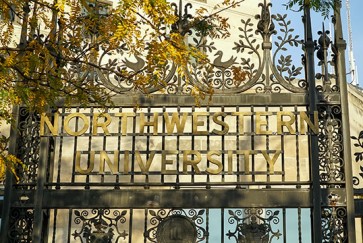Northwestern University students participated in significantly higher numbers in a recent survey on sexual misconduct on campus, compared to a similar survey conducted in 2015, the University’s Office of Equity reported today (Oct. 15).
Nearly three-quarters of the 5,398 Northwestern students who responded at all levels also said they believed the University would take a report of sexual misconduct at Northwestern seriously, according to the data collected by the 2019 Association of American Universities (AAU) Campus Climate Survey on Sexual Assault and Misconduct and unveiled today.
The number of Northwestern students who participated represented 25.2% of the Northwestern students invited to participate in the national survey by AAU, many more than the 15% participation rate during a similar survey on sexual misconduct administered by Northwestern in 2015. The AAU survey conducted earlier this year included students from 33 colleges and universities around the country.
Data and information obtained from the AAU survey will help Northwestern and other schools strengthen their ongoing efforts to deal with the critical issue of preventing and addressing sexual assault and misconduct on campus, said Colleen Johnston, director of sexual misconduct response and resources and Title IX coordinator for Northwestern’s Office of Equity.
Full results, data and highlights on the AAU survey administered at Northwestern, are here.
“Northwestern is committed to fostering a learning, working and living environment where all members of our community can thrive, free from sexual misconduct, and this survey data will help enhance University policies and priorities in this area going forward,” Johnston said in a message sent Oct. 15 to undergraduate and graduate students.
AAU President Mary Sue Coleman said, “This is the largest college-based probability sample survey carried out on sexual assault and misconduct, and it is a testament to the commitment that America’s leading research universities have to fighting these problems and improving the campus climate around these issues.”
Overall, 11.6% of Northwestern students surveyed this year reported experiencing at least one incident of nonconsensual sexual contact since enrolling at the University (including attempted penetration by physical force). This appears to be a decrease from 2015, when 16% of survey respondents reported experiencing sexual contact without consent and 4% reported experiencing sexual penetration without consent.
For different groups at Northwestern, however, that 11.6 percentage varies when broken down as follows in the current survey: 30.8% of undergraduate women, 11% of undergraduate men, 7.7% of graduate/professional student women, 1.8% of graduate/professional student men and 30.7% for trans, genderqueer or nonbinary and questioning (TGQN) students.
Other results showed:
- 15.3% of Northwestern students surveyed experienced sexual harassment, which is consistent with the 2015 survey rate of 15%.
- 6.8% of students in at least one partnered relationship since entering Northwestern reported experiencing at least one type of intimate partner violence. This is an increase from the 2015 rate of 4%.
- 3.7% of students experienced stalking, as defined by the survey. This is a decrease from the 2015 rate of 8%.
Certain groups of students reported experiencing higher rates of sexual misconduct than other groups. Undergraduate women and TGQN students reported experiencing higher rates of sexual harassment, intimate partner violence, stalking and nonconsensual sexual contact than others surveyed, the survey showed.
Non-heterosexual students who identify as LGBQA reported experiencing harassing behavior, intimate partner violence, stalking and nonconsensual sexual contact at higher rates than heterosexual students. Also, students with disabilities reported experiencing harassing behavior, intimate partner violence, stalking and nonconsensual sexual contact at higher rates than students who did not identify as having a disability.
“We are deeply concerned to see that some of our students, who may already face additional barriers because of their identities, are experiencing higher rates of sexual misconduct,” said Kate Harrington-Rosen, recently named director of equity outreach and education in the Office of Equity.
Some 74.3% of Northwestern students responding this year perceived that it was likely that campus officials would take a report of sexual misconduct seriously, while the overall percentage for all the schools in the AAU survey was 65.6%. Still, rates for Northwestern students in individual groups differed from the overall figures. For example, the perception on this question was 50% for undergraduate women and 46.1% for TGQN students, the survey showed.
Northwestern students in general reported being “very” or “extremely” knowledgeable about how sexual assault and sexual misconduct are defined at Northwestern (49.9%), where to get help (45.6%), where to make a report of sexual misconduct (39.2%) and what happens after an incident has been reported (25.4%). Northwestern’s students’ level of knowledge in each of these areas was noticeably higher than the AAU aggregate responses to these questions. Among other notable results, the vast majority of Northwestern students who reported witnessing sexual misconduct also reported taking some type of action.
Northwestern’s Office of Equity will use the data gathered to engage students during the academic year to help find more ways to combat sexual misconduct.
Throughout the year, a number of events will be held to engage the community in determining next steps and areas for further inquiry. During fall quarter, the focus will be on engaging students on the survey results. Winter quarter will involve engaging with schools. Spring quarter will be focused on engaging students by area of involvement.
Based on this review of the results and community feedback, in May 2020 the Office of Equity will release a summary of the work done and forthcoming action items.

